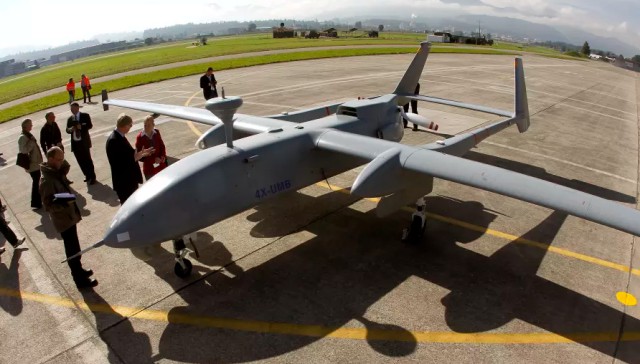Germany has extended its agreements for the use of Israel Aerospace Industry’s Heron-1 reconnaissance drones in Afghanistan and Mali for another year, IAI announced recently.
The contract includes the supply of assets and manpower to support the operation of the Israeli-made Heron-1 unmanned aerial-vehicle systems in the two countries where it is deployed.
In Mali, the system is stationed at the Gao Air Base for the German Federal Office of Bundeswehr Equipment, Information Technology and In-Service Support as part of the UN’s Multidimensional Integrated Stabilization Mission in Mali.
The Heron is used to secure the perimeter of the mission as well as to obtain intelligence concerning various militant groups in the northeastern Gao region for Germany which is in charge of the intelligence unit in Mali.
French and Malian forces drove al-Qaida in the Islamic Maghreb and other terrorist groups out of Timbuktu over four years ago, leading the jihadists to establish a base of operations in the vast arid north of the country bordering Mauritania and Algeria.
The Heron-1 is a medium altitude and long-term endurance craft with a maximum mission endurance of over 24 hours. Equipped with satellite data link and electro-optical infrared sensors, the Heron-1 is able to not only provide reconnaissance to ground forces in combat situations, assist in convoying and patrolling, create movement profiles and provide long-term monitoring, but it is also able to track down explosives from the air.
While the upkeep of the UAVs is carried out by Airbus, the analysis of the intelligence gathered by the Heron-1 is done by German forces.
According to Airbus, all “reconnaissance results are made available to the joint evaluation center of the MINUSMA [Multidimensional Integrated Stabilization Mission in Mali] Mission, contributing to increased security for all employees involved.”
Other Heron I systems are already in use in Mali, including by the French Air Force, which has been operating the Harfang variant of the Heron-1 since the beginning of the UN mission in January 2013.
The German Air Force has been operating the Herons in Afghanistan since 2010 where they were involved in thousands of missions. According to a statement by IAI, forces in Afghanistan and in Mali have logged more than 38,000 flight hours since 2016.
“The Heron system is a valuable asset for the protection of soldiers and civilians in the operational areas, thanks to the range of intelligence capabilities of up to 800 kilometers. The airborne intelligence capability of the German mission has increased significantly,” the company said.
Airbus DS Airborne Solutions GmbH CEO Thomas Warren said the Heron has proven itself with “a system readiness level greater than 95%.”
“The extension of contracts in Mali and Afghanistan by the Bundeswehr Equipment, Information Technology and In-Service Support Office is a confirmation of Heron’s proven ability to support missions around the world,” said Shaul Shachar, IAI Military Aircraft Group corporate vice president and general manager.
Photo:REUTERS/ARND WIEGMANN
Source: The Jerusalem Post

